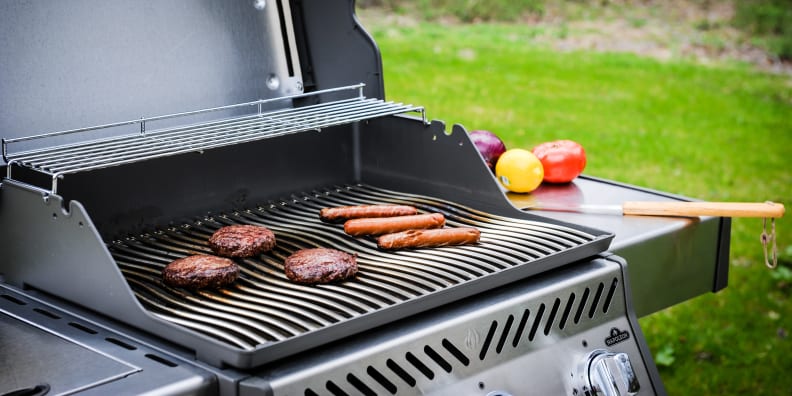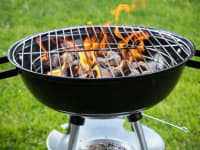10 things you should know before you buy a grill
Ready to buy a grill? Here's everything you need to know.
Products are chosen independently by our editors. Purchases made through our links may earn us a commission.
For some, summer is about making the most of the warm weather by relaxing with friends and family. But for grilling enthusiasts, this season is your chance to shine—and a prime opportunity to snag up a heavily-discounted new grill. Even if you buy one of the best grills on market and pick up all the essential tools for an epic barbecue, there's still a good chance your new grill might let you down.
How do I know? Well, in addition to my experience owning and cooking with both gas and charcoal grills, I had a great summer job when I was in college: I sold grills during peak grilling season, and I saw what happened when a customer had a problem.
I’m sharing my experience to ensure you spend most of the grilling season, you know... cooking, instead of searching for a rusted-over model number, waiting for replacement parts to arrive, or berating a teenage salesman for not having the right grate in stock.
No grill is perfect. But if you buy one our top-rated grills and keep our advice in mind, only a summer thunderstorm will keep you from enjoying your grill.
1. You get what you pay for
Cheap grills are usually sold in bulk at major retailers. They may wear a famous name, and they could cost as much as $400, but manufacturing is often contracted out to another company. New models debut in the winter, are shipped to retailers for the summer, and are never spoken of again once inventory runs out.
If you just want to get two or three summers out of it, a cheap grill is fine—just don’t spend more than $250, and don’t expect parts to be available when it breaks.
2. Some grills last longer

Our top-rated grills tend to have great reputations for parts availability and longevity.
Better grills typically come from manufacturers that specialize in grills, like Weber and Traeger. They're usually available year-round, year after year, and are available at more than one store. Replacement parts will be readily available at the same place you bought the grill.
The cheapest of these grills, typically charcoal, will likely cost around $150. Gas grills, on the other hand, typically start prices around $400—and go up rapidly from there. But with proper care, a good grill can last a decade or more.
3. You're going to have to buy parts
No matter what kind of grill you buy, you should have realistic expectations. After all, these are metal devices that sit outside and endure extreme temperatures. Parts will inevitably need to be replaced.
There’s a reason we recommended so many Weber grills. Weber has a relatively simple lineup and keeps models around for a while, which means replacement parts are readily available. The same is true for other manufacturers who sell at independent retailers, such as Napoleon.
4. "Stainless" can stain
The kind of stainless steel that's used on a grill can become discolored after exposure to heat, rain, and certain chemicals. Even the stainless steel cleaner you use to keep your refrigerator shiny may end up oxidizing your grill’s lid.
Many of our recommended grills use porcelain-enamel coatings instead of stainless. But if you do buy stainless, don’t obsess over it. Once you fire it up, it'll never look as good as it did when you saw it on the showroom floor.
5. Rust is still a problem, even with stainless
Stainless steel shines under a store’s bright lights, but that doesn’t necessarily mean the rest of the grill won't rust.
There are different grades of stainless steel. For instance, 304 is generally recommended over 430 because it's less likely to rust. The gauge of stainless matters, too—a thin layer of stainless is less durable than a thick, porcelain-enamel coating.
Even top-tier grills aren’t made entirely of thick 304-grade stainless, leaving legs, supports, and other interior parts vulnerable to rust.
6. You'll probably have to put your grill together
Nearly all grills are shipped from manufacturers unassembled, in boxes. That's a nightmare for consumers and retailers alike.
Offers of “free assembly” from big box stores usually come with the unspoken caveat that you’ll have to get the grill home yourself. Unless you own or rent a pickup, all those pre-assembled grills chained up in the parking lot are staying right where they are.
7. Don't expect free delivery
Assembled grills are fragile, and major retailers don’t want to take the risk of dropping off a damaged product. Proper packing and shipping for an assembled grill can cost as much as the grill itself.
Some smaller retailers offer at-home assembly or local delivery, but there are usually additional charges involved—sometimes doubling or tripling the price of a grill. If you're able—or have friends and family that can help—it’s always better to do it yourself. After all, grills are designed to be assembled by the user.
8. Spend extra on a grill cover
Whether you’re spending hundreds or thousands on a grill, you owe it to yourself to spend another $20 on a cover.
If you want to keep your grill outdoors, a cover will keep rain from rusting it out. But covers aren’t just about keeping out water; they're useful even if you plan to keep your grill indoors. For instance, spiders frequently build webs inside gas burners, rendering them useless.
9. But don't tie that cover too tight
Covering a grill doesn’t mean hermetically sealing it. If you tie a cover around its legs and block all airflow, even the smallest amount of remaining water will be trapped and cause rust.
10. Know your grates
Everyone knows you clean a grill with a wire brush, right? Wrong! Some grills have porcelain enamel grates, which are coated in a protective covering that can be scratched by wire or steel wool. Scrubbing those grates will make them harder to clean in the long run.
Plus, cleaning a grill with a wire brush means running the risk of having those small wire bits fall off into the food, which can pose dire health risks. Instead, we recommend a bristle-free grill brush instead.
Before you clean, read the owner's manual that came with your grill. It will tell you whether you have cast iron, stainless steel, or porcelain enamel grates. It will also tell you how to keep them clean.


